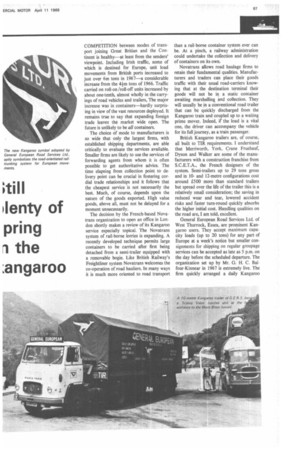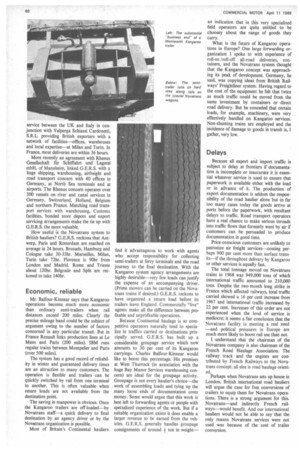it ill
Page 69

Page 70

If you've noticed an error in this article please click here to report it so we can fix it.
Ilenty of pring the angaroo
COMPETITION between modes of transport joining Great Britian and the Continent is healthy—at least from the senders' viewpoint. Including Irish traffic, some of which is destined for Europe, unit load movements from British ports increased to just over 6m tons in 1967—a considerable increase from the 4.1m tons of 1966. Traffic carried on roll-on /roll-off units increased by about one-tenth, almost wholly in the carryings of road vehicles and trailers, The major increase was in containers—hardly surprising in view of the vast resources deployed. It remains true to say that expanding foreign trade leaves the market wide open. The future is unlikely to be all containers.
The choice of mode to manufacturers is so wide that only the largest firms, with established shipping departments, are able critically to evaluate the services available. Smaller firms are likely to use the services of forwarding agents from whom it is often possible to get authoritative advice. The time elapsing from collection point to delivery point can be crucial in fostering cordial trade relationships and it follows that the cheapest service is not necessarily the best. Much, of course, depends upon the nature of the goods exported. High value goods, above all, must not be delayed for a moment unnecessarily.
The decision by the French-based Novatrans organization to open an office in London shortly makes a review of its Kangaroo service especially topical. The Novatrans system of rail-borne lorries is expanding. A recently developed technique permits large containers to be carried after first being detached from a semi-trailer equipped with a removable bogie. Like British Railway's Freightliner system Novatrans welcomes the co-operation of road hauliers. In many ways it is much more oriented to road transport than a rail-borne container system ever can be. At a pinch, a railway administration could undertake the collection and delivery of containers on its own.
Novatrans allows road haulage firms to retain their fundamental qualities. Manufacturers and traders can place their goods traffic with their usual road-carriers knowing that at the destination terminal their goods will not be in a static container awaiting marshalling and collection. They will usually be in a conventional road trailer that can be quickly discharged from the Kangaroo train and coupled up to a waiting prime mover. Indeed, if the load is a vital one, the driver can accompany the vehicle for its full journey, as a train passenger.
British Kangaroo trailers are, of course, all built to TIR requirements. I understand that Merriworth, York, Crane Fruehauf, Dyson and Walker are some of the manufacturers with a construction franchise from S.C.E.T.A., the French designers of the system. Semi-trailers up to 29 tons gross and in 10and 12-metre configurations cost around E500 more than standard trailers but spread over the life of the trailer this is a relatively small consideration; the saving in reduced wear and tear, lowered accident risks and faster turn-round quickly absorbs the higher initial cost. Handling qualities on the road are, I am told, excellent.
General European Road Services Ltd. of West Thurrock, Essex, are prominent Kangaroo users. They accept maximum capacity loads (up to 20 tons) for any part of Europe at a week's notice but smaller consignments for shipping on regular groupage services can be accepted as late as 5 p.m. on the day before the scheduled departure. The organization set up by Mr. G. H. C. Balfour-Kinnear in 1967 is extremely live. The firm quickly arranged a daily Kangaroo service between the UK and Italy in conjunction with Valperga Schiassi Cardonetti, S.R.L. providing British exporters with a network of facilities—offices, warehouses and local expertise—at Milan and Turin. In France, most deliveries are within 36 hours.
More recently an agreement with Rhenus Gesellschaft fur Schiffahrt und Lagerei mbH, of Mannheim, linked G.E.R.S. with a huge shipping, warehousing, airfreight and road transport concern with 40 offices in Germany, at North Sea terminals and at airports. The Rhenus concern operates over 300 vessels on river and canal services in Germany. Switzerland, Holland. Belgium and northern France. Matching road transport services with warehousing, Customs facilities, bonded store depots and export servicing arrangements make the tie up with G.E.R.S. the more valuable.
How useful is the Novatrans system to British hauliers? G.E.R.S. reckons that Antwerp, Paris and Rotterdam are reached on average in 24 hours. Brussels, Hamburg and Cologne take 30-33hr. Marseilles, Milan, Turin take 72hr. Florence is 90hr from London and Madrid. Rome and Trieste about 120hr. Belgrade and Split are reckoned to take 140hr.
Economic, reliable
Mr. Balfour-Kinnear says that Kangaroo operations become much more economic than ordinary semi-trailers when rail distances exceed 200 miles. Clearly the precise mileage band could be the subject of argument owing to the number of factors concerned in any particular transit. But in France Renault links production lines at Le Mans and Paris (200 miles). IBM runs regular trains between Montpelier and Paris (over 500 miles).
The system has a good record of reliability in winter and guaranteed delivery times are an attraction to many customers. The operation is flexible and trailers can be quickly switched by rail from one terminal to another. This is often valuable when return loads are not available from the destination point.
The saving in manpower is obvious. Once the Kangaroo trailers are off-loaded—by Novatrans staff—a quick delivery to final destination by an agency driver or by the Novatrans organization is possible.
Most of Britain's Continental hauliers find it advantageous to work with agents who accept responsibility for collecting semi-trailers at ferry terminals and the road journey to the final destination. With the Kangaroo system agency arrangements are highly desirable—very few loads can justify the expense of an accompanying driver. (Prime movers can be carried on the Novatrans trains if desired.) G.E.R.S. reckons to have organized a return load before its trailers leave England. Commercially "live" agents make all the difference between profitable and unprofitable operations.
Because Continental haulage is so competitive operators naturally tend to specialize in traffics carried or destinations principally served. G.E.R.S. has built up a considerable groupage service which now amounts to 30 per cent of its Kangaroo carryings. Charles Balfour-Kinnear would like to boost this percentage. His premises at West Thurrock (in association with the huge Bay Manor Services warehousing concern) are ideal for the groupage activity. Groupage is not every haulier's choice—the work of assembling loads and tying up the many loose ends of documentation costs money. Some would argue that this work is best left to forwarding agents or people with specialized experience of the work. But if a suitable organization exists it does enable a larger revenue to be earned from the vehicles. G.E.R.S. generally handles groupage consignments of around + ton in weight—
an indication that in this very specialized field operators are quite entitled to be choosey about the range of goods they carry.
What is the future of Kangaroo operations in Europe? One large forwarding organization I spoke to with experience of roll-on /roll-off all-road deliveries, containers, and the Novatrans system thought that the Kangaroo concept was approaching its peak of development. Germany, he said, was copying ideas from British Railways' Freightliner system. Having regard to the cost of the equipment he felt that twice as much traffic could be moved from the same investment by containers or direct road delivery. But he conceded that certain loads, for example, machinery, were very effectively handled on Kangaroo services. Non-shunting trains are employed and the incidence of damage to goods in transit is, I gather, very low.
Delays
Because all export and import traffic is subject to delay at frontiers if documentation is incomplete or inaccurate it is essential whatever service is used to ensure that paperwork is available either with the load or in advance of it. The production of export documentation is seldom the responsibility of the road haulier alone but in far too many cases today the goods arrive at ports before the paperwork, with resultant delays to traffic. Road transport operators have a real chance to make serious inroads into traffic flows that formerly went by air if customers can be persuaded to produce documentation in good time.
Price-conscious customers are unlikely to patronize air freight services—costing perhaps 900 per cent more than surface transits—if the throughout delivery by Kangaroo or other services is equally fast.
The total tonnage moved on Novatrans trains in 1968 was 949,000 tons of which international traffic amounted to 210,000 tons. Despite the two-month long strike in France which affected railways, total traffic carried showed a 16 per cent increase from 1967 and international traffic increased by 22 per cent. Increases of this order are not experienced when the level of service is mediocre; it seems a fair conclusion that the Novatrans facility is meeting a real need and political pressures in Europe are much more likely to boost rail use than not.
I understand that the chairman of the Novatrans company is also chairman of the French Road Haulage Association. The railway track and the engines are contributed by French Railways to the Novatrans concept; all else is road haulage oriented.
Perhaps when Novatrans sets up house in London, British international road hauliers will argue the case for free conversions of trailers to equip them for Novatrans operations. There is a strong argument for this. Novatrans—and indirectly French railways—would benefit. And our international hauliers would not be able to say that the only reason Novatrans services were not used was because of the cost of trailer conversion.












































































































































